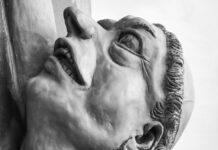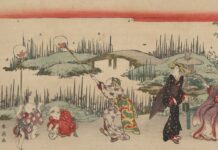The two weeks the Tang minister Fang Xuan-ling stole from his work in the capital to visit the poet/peasant Chen Hsi-wei in Chiangling were up. Late in the afternoon of the final day at the poet’s little cottage outside the city last visit to Hsi-wei’s little cottage, Fang asked the retired poet and sandal-maker about the end of the dynasty in which he’d live almost his entire life.
“You must have been deeply affected. After all, you helped to start it,” said Fang.
“You mean that message I delivered as a boy?”
“Yes, the secret message to General Fu, the one inscribed on your scalp.”
Hsi-wei made a gesture as if brushing away a fly. “Who can say if it really made any difference. Five armies were sent from Northern Zhou into Southern Chen. General Fu’s was only one. Besides, the message might have been out-of-date by the time I delivered it.”
Fang smiled at Hsi-wei’s unshakable, willful modesty.
“Would the First Minister have offered you rewards if the message had been of no use?”
“I don’t know. Perhaps it was because I managed to survive. I’ve no idea how many peasant boys with quick-growing hair didn’t. It could have been hundreds.”
Fang chuckled. “As you wish, Master Hsi-wei. But do tell me. What did you feel when you learned about the end of the Sui?”
“At the very moment I heard, you mean?”
“Yes, then. Everybody remembers when and where they first heard the news.”
“And so do I. But the truth is that I was distracted by something else at the time. I took in the news but only reflected on it later. I suppose that like other peasants I was relieved and hoped for something better.”
“You respected Emperor Wen.”
“Yes, although with some ambivalence. But yes, he accomplished a great deal and I admired him.”
“But not Emperor Yang.”
“As you know very well, Yang was a terrible emperor and a monstrous man. He destroyed his father’s dynasty with his grandiose projects, his catastrophic wars, and his personal extravagance. The wonder is Heaven took fourteen years to lift its mantle.”
“And you believe the story that he killed his father?”
“Certainly. It’s exactly what he would do.”
The two men fell silent and watched the sun go down over the fields and the low hills beyond. Fang was making plans for all he’d accomplish on his return to Chang’an. He had faith that the new dynasty would be a glorious one and long-lived. Still, though work would have piled up, he didn’t regret having taken two weeks visit to Hsi-wei and glad that he kept a record of their conversations. Listening to Hsi-wei’s tales sometimes felt like looking back on the best of the worst because, much as he loved Hsi-wei’s poems, his heart belonged to the future. As for Hsi-wei, he had enjoyed their conversations more than he expected. Explaining where his poems had come from was also reviewing his life which, like the minister’s visit, would soon end.
Fang was about to stand and begin his farewell when he recalled something interesting Hsi-wei had said.
“Master Hsi-wei, tell me more about when you learned about the death of Emperor Yang. You said your mind was on something else. I wonder, what could have been more absorbing than such news?”
Hsi-wei smiled indulgently and for the first time felt like an old man talking to a young one, not a peasant talking to a minister who happened to like his verses. It was Fang’s insatiable curiosity that was responsible. Like an inquisitive child, the minister had a bottomless bag of questions. As for this one, Hsi-wei remembered the day very well; it was barely four years ago. Telling about it make be a fitting finale to Fang’s visit. Doesn’t everything end—visits, poems, lives, dynasties, even love?
“In those days, I still used to walk to Chiangling once a week. It’s quiet here. I suppose I missed my life on the road and also the noise and variety of a city. It’s not unusual, is it—craving the country when in town and vice versa?”
Fang nodded. “Not at all,” he said. “People want excitement and, when they get it, long for peace.”
“That’s true. We’re in-between creatures, higher than the worms, lower than the swallows. Anyway, the day I heard the news I was in Chiangling. I liked spending time with the peddlers in the marketplace and some have become good friends. Nostalgia for my old life, you’ll say, selling sandals everywhere, and that’s true, too. At first, it felt strange without my pack, my sign, not taking orders for straw sandals. Well, that day I fell into conversation with the dumpling seller, Mrs. Cheng, a widow. She is fat in a jolly way and good-natured. We’re of an age and just like each other. I’ve presented her with more than one pair of straw sandals. She likes hearing about the places I’ve seen, and I like her gossip. Somehow, Mrs. Cheng learned that I used to write poems, a fact she regards at times almost with awe, but at others as simply hilarious.”
“Hilarious?”
“Oh yes. Making sandals is respectable. You can use sandals. She teases me about it. Once she asked me what I write on. I told her I wrote about mountains and rivers but mostly about the doings of people I came across—peasants, soldiers, craftsmen, even ministers and their wives, the rich and poor.
“Then I noticed that she was laughing at my answer and could barely contain herself. ‘No, no,’ she said bursting out. ‘I asked what do you write on. Do you write your poems on wood or cloth? Paper is so awfully expensive.”
“Amusing,” said Fang, who was not amused at all.
“Well, that particular day Mrs. Cheng was troubled rather and in no mood for teasing. I asked her what the matter was.
“‘It’s my friend Mrs. Liao—or, I suppose, her very pretty daughter Li-hua. You see, the girl’s got two suitors—well, dozens actually, but just the two serious ones. The old one is less good-looking than the young one and not nearly so well-off either. The young one’s family—that’s the Kangs—does a good business supplying tackle to the Emperor—pulleys and rope and what-not. They use the stuff up fast at the Canal and even faster at the Wall, those cursed projects that kill more people than all the Emperor’s ruinous wars put together.’
“She was getting wound up and I reminded her of her friend. We’d discussed the Cana and the wall before and I was more interested in the private drama than the public ones.
“‘Oh yes,’ she said. ‘Well, that Li-hua was always a smart girl as well as a pretty one. She was a favorite of a neighbor of the Chengs, Mr. Gao, a retired magistrate clerk. He’s dead now. But when he was teaching his son to read, you see, he taught her too. Li-hua. And that was very unlucky.’
I was surprised. “‘How so?’ I asked.
“‘Just listen,’ said Mrs. Cheng impatiently. ‘It’s what led to the whole problem which is that the foolish girl’s fallen in love with the wrong suitor, the old one without either good looks or a tackle business. Mrs. Liao has given the girl good arguments and berated her and threatened her and had her brother Donghai in to give her sound advice, too. But Li-hua prefers the old, poor, ugly man. And do you know why?’
“I said I didn’t.
“‘It’s because of their gifts. Kang’s given her a bracelet made of real silver and a jade statuette of Yang Asha, and a red robe, a silk one. The other gives her nothing except poems. Can you believe it? No offense. I know you write poems too—good ones, or so I’m told. But even you’ll admit that a rich young businessman will provide better for Li-hua and her children than a poor childless widower who writes poems hardly anybody around here can read—very bad ones, for all I know—and whose good years are as far behind him as I hope the Turks are behind the Wall which has probably killed more people than the Turks would if there wasn’t any.’”
Fang smiled at Hsi-wei’s imitation of Mrs. Cheng’s way of speaking, also the incongruity between some poor girl’s choice of a suitor and the collapse of an imperial dynasty. And yet, he sensed that there was something serious for Hsi-wei in the matter of Li-hua. Then he realized that the story of the two suitors would have touched Hsi-wei because of how it resembled the poet’s own case, to what had happened all those years ago when Chang’an was still called Daxing. He remembered what Hsi-wei had revealed to him when asked the poet about the poem people call “The Cruelty of Springtime”. Hsi-wei had told him about Tien Miao, how Hsi-wei had given up the beautiful young widow to his wealthy rival, Hu Zhi-peng. “That’s what set me on the road,” was all Hsi-wei said of this turning-point in his life. He kept his feelings to himself only confessing that all these decades later he still dreamed of Tien Miao.
“Mrs. Cheng was trying to remember the old suitor’s name when we heard shouting from the direction of the Governor’s residence. It was like a wave from a rock tossed in a pond, the way the noise spread through Chiangling. The clamor of mobs sounds unanimous but its meaning isn’t always clear. What we heard could have been grief as easily as joy, another rout in the East, another landslide at the Canal. I saw a man I knew hurrying by, Mr. Zhao, a candlemaker. He told us that the Magistrate had just read out a proclamation that Emperor Yang was dead.”
The sun was halfway behind the hills and the field was already dark. The time had come to leave. Fang got to his feet. The men took one another’s hands. Hsi-wei bowed and thanked his distinguished guest for coming, also for his gifts of which, he said, Fang’s interest was the most precious. Neither pretended that they would ever see one another again.
Fang stopped, curious to the end.
“One last thing, Master Hsi-wei. Do you know which suitor Li-hua married?”
“The rich one, of course.”
“Ah. Yes, of course. Tell me, did that disappoint you?”
“Disappoint me? Not at all, My Lord. I agreed with Mrs. Cheng and Mrs. Liao.”
“Do you wonder what became of the other man, the old one, the one she rejected but loved?”
“Oh, I expect he wrote a lot of poems about it. By the way, I wrote some verses too, about the end of Emperor Yang. I wrote the poem on that day. It’s one of my last.”
“Would you show me?”
Hsi-wei went into the cottage and came back with a small scroll.
After reading it, Minister Fang asked if Hsi-wei would make a copy for him.
“I’ll gladly wait,” he said. “I would treasure it, and I know many people in the capital who would like to see it.”
Here is Hsi-wei’s poem. The title was chosen by Fang Xuan-ling.
The Death of Emperor Yang
The blighted plum tree can still bear fruit
Though its sweetness will taste of poison.
I’ve read his verses. They aren’t bad. I’d
rather they were or that someone else had
composed them, some poet he’d sent to die in exile.
Waking, he’d think, today I’ll write verses about gardens
And tonight sleep with whichever minister’s wife admires
Them most. I’ll gorge her on oysters and pomegranates.
Tomorrow, I’ll order the next invasion of Goguryeo
And ten thousand more to dig and die at the Canal.
The victor of Chen was brave and handsome once,
Cunning enough to shove aside his brother, the Crown Prince,
Wicked enough to assassinate his to- indulgent father,
Cruel enough to throw ten million lives at a wall, into a ditch,
Stubborn enough to mire armies in southern swamps, eastern ravines.
Today I heard he had to flee to his palace in Jiangdu
Where, they say, General Yuwei himself saw to the strangling.
But I had no thought for a ruined dynasty turning into dust,
For vicious princes, fed-up generals, the great world. For me,
There was more at stake in the tale of a young girl’s love.
About the Author

Robert Wexelblatt is a professor of humanities at Boston University’s College of General Studies. He has published eight collections of short stories; two books of essays; two short novels; two books of poems; stories, essays, and poems in a variety of journals, and a novel awarded the Indie Book Awards first prize for fiction.
















